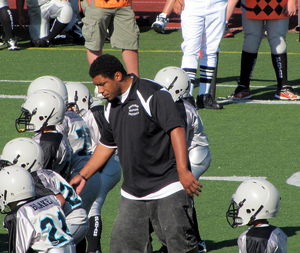
Source: Coach Andrew James Hunkin 055,
Baha’i Views / Flitzy Phoebie’s photostream, Flickr
We began this lesson talking about ways to make your writing more interesting by combining shorter sentences into longer, more complex ones. Now, let’s see how this might work in the real world.
Consider an assignment that asks you to write a persuasive essay. A first draft might look something like this:
Joe Perry deserves an award for being helpful. He is a great man. He has helped many people.
Joe Perry is the football coach. He coaches eighth-grade football. Eighth-grade football was new to me. Perry helped me with my football problems. I didn’t know how to catch. I didn’t know how to run the ball. I didn’t know how to tackle. He saw I was having problems. He showed me some examples.
The first thing you might notice is that there are several short sentences. They have important information, but the information seems to come in spurts and is not as smooth as it could be. We can combine some of these sentences to help improve this draft by using the subordinating conjunctions below. Notice that the ones listed express certain conditions. For example, as soon as expresses something that occurs as a result of the passage of time.
| As, because, and that are used to show cause. |
| Although, as, just as, though, and while are used to make comparisons. |
| Where and wherever refer to place. |
| Even if, if, in case, and unless indicate a condition must be met. |
| After, as soon as, as long as, before, once, still, till, until, and when relate to time. |

Source: here’s looking at you,
Catherine-Elizabeth, Flickr
Now, read the first sentence of the draft you read earlier.
Joe Perry deserves an award for being helpful.
This seems like a fine sentence. It introduces a subject (Joe Perry) and tells something about him. Now, read the next sentence.
He is a great man. He has helped many people.
Keeping in mind what we have discussed about sentence combining, we could join these two sentences with the subordinating conjunction because. The result is as follows:
Because he has helped many people, he is a great man.
Now, move on to the next few sentences in the draft.
Joe Perry is the football coach. He coaches eighth-grade football. Eighth-grade football was new to me. Perry helped me with my football problems.
We have some work to do to make this message more powerful. We can combine some of these sentences, and there are several ways to do it, given that writing is a creative process. As long as we follow the English conventions discussed in this lesson, we could choose different ways of combining the sentences, depending on what we want to convey. Here is one possibility:

Source: Subordinating Conjunctions,
IPSI, Wordle
Joe Perry is the football coach, and he coaches eighth-grade football. Because eighth-grade football was new to me, Perry helped me with my football problems.
Choosing a subordinating conjunction is dependent on your message. One way to choose the right one is to look at subordinating conjunctions in a chart such as the one at the beginning of this section. Reading through the chart while keeping in mind the message you want to convey to readers is a pretty straightforward way to go about it. For example, you could glance at the chart, choose a subordinating conjunction, and plug it into your sentence to see if it fits your meaning. Let’s say you choose whenever. Plugging it into your sentence would look like this:
Joe Perry is the football coach, and he coaches eighth-grade football. Whenever eighth-grade football was new to me . . .

Source: Sign Post, Nick Treby, Flickr
Chances are you would stop there because it sounds incorrect. Eighth-grade football being a new thing to you is not a time-dependent kind of thing, is it? If it is new to you on a Monday, it would still be fairly new to you on Tuesday. In that case, you might go through the list and plug in other options that don’t have to do with time. You could go on like this until you land on a subordinating conjunction that fits your meaning just right.
Think of subordinating conjunctions like sign posts. They give your reader hints about the direction a sentence is going to take.
 Using your notes, revise the rest of the paragraph, shown below, keeping in mind the purpose for combining sentences, as well as any punctuation that might need to be added. When you’re finished, check your understanding to see a possible response.
Using your notes, revise the rest of the paragraph, shown below, keeping in mind the purpose for combining sentences, as well as any punctuation that might need to be added. When you’re finished, check your understanding to see a possible response. Perry helped me with my football problems. I didn’t know how to catch. I didn’t know how to run the ball. I didn’t know how to tackle. He saw I was having problems. He showed me some examples.
Sample Response:
He saw I was having problems because I didn’t know how to catch, run the ball, or tackle. After he showed me some examples, my football skills improved.